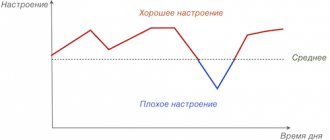The difficulty in treating masked depression lies in its diagnosis. Unfortunately, this form of depression is very difficult to diagnose and only a very competent doctor is able to correctly assess a person’s condition. This form of depression is often defined by doctors as hidden depression.
To diagnose masked or hidden depression, it is necessary to look for signs other than signs of sadness and depression. Read the article to the end and you will learn how depression can hide, put on the mask of a wide variety of diseases.
In this regard, therapy for masked depression is unable to achieve its main goal. Our specialists have extensive experience in clinical and differential diagnosis. It is also worth noting that in our clinic the patient is examined by several specialists and for each a medical consultation is held free of charge. This eliminates the possibility of an erroneous diagnosis.
If a person undergoes a full course of treatment for latent depression, strictly following all the doctor’s instructions, then he gets rid of it.
It is difficult to help someone who does not admit his illness, someone who will not talk about his state of mind. It is a daunting task to throw a lifeline to those who deny possible help. And yet, we must strive to understand and help those who live with it.
Perhaps you have heard of the mind-body connection? About how the power of the mind can affect the condition of your body?
If you feel depressed, you can feel it in your own body - your body may hurt, your bones may ache, various organs may ache, and your head may be pounding from a migraine.
Brain Clinic specialists treat masked depression using individually adapted methods. The concept of these techniques is an organic synthesis of the principles of restorative medicine, therapy, psychotherapy, neurology and psychiatry. Therefore, we will be able to establish an accurate and complete diagnosis and treat hidden depression with maximum effect.
Call
We help in the most severe cases, even if previous treatment did not help!
What is masked depression?
Masked depression revolves around the concept of mind and body.
This type of depression does not manifest itself in the form of classic depression, it is hidden behind various somatic diseases. Adults may complain of constant fatigue and pain (other unpleasant sensations in the body). Many doctors cannot find any reason in the form of diseases of internal organs or other somatic diseases. In children and adolescents, masked depression may manifest itself in the form of aggression or behavioral disturbances. Such children are referred to a psychologist, but the main problem remains unnoticed. Therefore unsolved.
Similarities and differences
Usually people have a clear understanding of depression. A person tends to think that a sure sign of depression is a feeling of helplessness and hopelessness, difficulty getting out of bed, sadness, a sharp drop in mood, apathy, lack of interest in anything, a depressed state and other signs that are closely related to mood, and this happens every day. That's all there is to recognizing depression, right?
Many people believe that depression is easily identified when it manifests itself as constant sadness. In fact, symptoms of depression can take many subtle forms.
Chances are, if you are reading this article, you have a feeling that something is not quite right with you. You may find that you are very tired all the time and all you need to do is get a good night's sleep.
However, masked depression often appears as something completely different and can cause insomnia, forgetfulness, and an inability to enjoy normal activities, pain or discomfort anywhere, memory loss, decreased or absent sexual satisfaction or desire, fatigue, and much more. much more.
Causes
In most cases, the disease develops after sudden changes that were unfavorable. These include:
- Marriage breakdown.
- Dismissal from work.
- Parting with a loved one.
- Moving.
- Completion of studies.
Family problems and conflicts also play an important role. With an unstable emotional background in a family where there is no understanding and difficult living conditions, there is a high risk of developing hidden depression. At the same time, a person himself cannot do anything. He will lead his usual lifestyle, try to resist the environment, but depression will affect his physiology.
Difficulties in diagnosis
Masked depression - “in the mask” of somatic diseases.
The difficulties of treating masked depression begin with its diagnosis; it is more difficult to identify than ordinary depression with its classic triad: decreased mood, slowed thinking, slowed motor activity. The symptoms of masked depression are not typical. Depression can be hidden in several directions, “in a mask.”
Such manifestations of depression are called masked depression, otherwise they can be called larved or hidden depression.
As a rule, in most cases, general practitioners often incorrectly diagnose the somatic complaints of patients, because patients always complain only about somatic symptoms, not to mention their internal experiences, and most practitioners do not know that such symptoms belong to depression. Typically, masked depression is mild, but tends to develop into chronic forms. Without proper treatment, over time, patients often become worse and this can trigger the manifestation of more serious disorders, such as a suicide attempt, which can end successfully. The exact cause of the development of masked depression still remains not entirely clear, but according to the results of many functional studies (these data are very important in the diagnosis of hidden forms of depression), practicing medical specialists are well aware of the mechanisms of development of such conditions. And carrying out differential diagnosis from somatic pathology is also important and should be inseparable from a full diagnostic procedure.
“Diagnosing masked depression in children and older people is very difficult because they don’t say, ‘I’m depressed. They are more likely to attribute their condition to physical illness, to what they feel - pain in different parts of the body, memory problems, poor sleep, changes in appetite, says Dr Anne Fabini, head of geriatrics at the Cambridge Health Alliance.
Older people, particularly older men, display their depression in unusual ways. In older men, depression may manifest itself as increased irritability more often than women. Thus, the grumpy old man stereotype may be a sign of a depressed old man. A new report from the Centers for Disease Control and Prevention shows that depression is more common among women (10.7% of adult women) than men (7.7% of adult men). And although depression tends to peak between the ages of 45 and 64, it can appear at any point in a person's life.
Frequent complaints with masked depression
- sleep problems,
- lack of energy,
- fatigue,
- problems with concentration or memory,
- loss of appetite,
- pain or discomfort in various parts of the body,
- pains that don't go away
- therapists and other doctors do not find diseases that could be the cause of the complaints expressed.
Diagnostics
In a conversation with a patient, the doctor first of all pays attention to long periods of depression, a decrease in the range of interests, and motor retardation. Patient complaints of apathy, loss of strength, increased anxiety, and suicidal thoughts play an important diagnostic role. There are two groups of signs of the depressive process that the doctor takes into account when diagnosing. These are positive and negative affectivity (emotionality). Additional diagnostic signs of depression are:
- family history - if among the patient’s relatives there were people suffering from depressive disorder (especially bipolar), or if there were suicides among the immediate family;
- patient's personality type – anxious personality disorder is a risk factor for depression; previous history of depression or mania;
concomitant somatic chronic pathologies; alcoholism – if the patient is partial to alcohol, then this is also a risk factor for depression.
Most people with underlying depression experience migraines, neck pain, and headaches.
Treatment of masked depression
More often than not, patients do not like to take conventional antidepressants due to various side effects and fear of these drugs. Therefore, in the treatment of masked depression, we recommend using very small doses of drugs in combination with herbal drugs and special psychotherapy.
Due to misconceptions about the disease, many patients of different ages are more inclined to take a wide variety of medications than to meet with a psychotherapist or psychiatrist.
However, it has been found that many antidepressants prescribed in conventional regimens are generally ineffective. This is especially true for older people. They can delay treatment for months and years. The risk of side effects with standard therapy for masked depression is significantly greater.
Research from the International Center for Disease Control and Prevention has shown. An adequate combination of medications in small doses and psychotherapy is most effective.
Example of complaints
As an example, we will describe a fairly common option for trying to treat masked depression and contacting us with complaints. The man went through many doctors several times. At the time of treatment, he did not consider his illness to be related to a change in mental state.
I am 25 years old, female. I’ve been sick for 5 years now, I don’t know why. Before this illness I had very little pain. And only a cold. She didn’t fall, didn’t hit herself, there were no surgeries. I have always been active and healthy. It all started with the fact that I was very cold, and because of this, cramps began in my fingers, then periodic weakness in my legs, as if my legs were giving way on their own. I even fell several times and couldn’t get up. When they lifted me up, it was as if nothing had happened, she even ran calmly. Later this weakness spread to the whole body and began to intensify. Now I have: weakness in my arms, hands, fingers, my shoulders are heavy and don’t listen to me well. I practically don’t go outside because I have terrible weakness in my legs, sometimes to the point of trembling. I need qualified help, but I still can’t figure out which doctor. Over the past 5 years, I have lost a lot of weight and lost weight; I have no appetite. I’m scared to go out alone and I can’t. My eyelids did not droop, I swallowed well, but the feces became somehow soft, unformed, and smelled strongly. There are constipation or disorders that alternate, a feeling of bloating, as if inflated from the inside. A feeling of heaviness, slight pressure in the solar plexus area, and I often feel slightly nauseous. I have been to many different doctors, but everyone gives different diagnoses. First they diagnosed multiple sclerosis, then myopathy, later myasthenia gravis, lumbar ischialgia, and osteochondrosis. Other doctors talk about irritable bowel syndrome, the presence of worms, bulbitis, gastrodenitis, pancreatitis, reflux. I went to all the doctors, went through all the examinations 2-3 times. But they still can’t diagnose me. No treatment helps. Plasmapheresis, hormones, a bunch of injections, pills, manual therapy, acupuncture, homeopathy. Zero reaction. The latest diagnosis is myopathic-myasthenic syndrome. Every doctor finds something, and I start another useless treatment. I even saw an oncologist, but the doctor, after listening to me, told me to go to a psychiatrist because I was depressed. But I don’t feel apathy and I don’t have tearfulness, I can laugh normally. It seemed to me that he just wanted to get rid of me. However, my condition is getting worse every time and I am very scared that nothing helps. Can I do some more tests? No one in our family had anything like this. As a child, I was bitten by a tick, but the doctors did a test and said it wasn’t the cause. What tests can be done, where to go? I have a child, I want to live!
Mental disorders have recently become more important among diseases. Often mental disorders are detected in somatic patients. According to P. Pichot, morbidity rates for depressive symptoms amount to 6% of the adult population. Among them, a significant part is made up of somatized (masked or hidden) depression. According to the referral rate among general somatic patients, affective disorders were identified in 87% of patients. Among them, patients with somatized depression make up from 7 to 31%, and are more often detected in women. According to V.F. Desyatnikov, “the problem here is not only gnostic, but mostly practical”; 27% of patients with depression consult a psychiatrist 5 or more years after the onset of the disease. This is due, on the one hand, to insufficient professional training and awareness of general practitioners about the relevant mental illnesses, and on the other hand, to the peculiarities of the “internal picture of the disease,” when patients report to doctors only those signs that they themselves understand and which are more worry without focusing the doctor’s attention on depressive manifestations in the form of depression, depression, and anxiety. In depressive states, along with changes in the affective sphere, changes occur in both the somatic and cerebral spheres. At different stages of the development of depression, somatic symptoms in the body undergo changes. Sometimes somatic symptoms precede the onset of depression and, or hide depression. Depression is manifested by pronounced somatovegetative disorders: malaise, weakness, attacks of palpitations, suffocation, feelings of lack of air, air obstruction, nausea, vomiting, constipation, or diarrhea, urination problems, pain in the chest, feeling of cold in the chest, abdomen, spine, headache. Patients are examined and treated for a long time for various somatic and neurological diseases, treatment does not lead to relief of the patient’s condition. V.F. Desyatnikov and T.T. Sorokina identify five main variants of latent depression: algic-senestopathic, agrypnic, diencephalic, obsessive-phobic and drug addiction.
The most common of these variants is the algic-senestopathic variant. In this case, it manifests itself as excruciating pain that is difficult for patients to describe, various unpleasant sensations that last for hours or days. For abdominal pain and senestopathies, they are treated for peptic ulcers, gastritis, pancreatitis, cholecystitis, and sometimes require surgical treatment of appendicitis, or surgical treatment in the rectal area. For cardialgia and suffocation, an ambulance is called many times. “Heart” medications do not improve the condition, so patients repeatedly seek emergency care. Taking tranquilizers provides short-term relief. And again, various pain sensations in the chest continue to bother me. In connection with headaches and dizziness, osteochondrosis, vertebral artery syndrome, and vegetative-vascular dystonia are treated. In some cases, pseudoanginal, pseudoasthmatic, visceral disorders resemble vegetative-vascular dystonia of a diencephalic nature (diencephalic variant of latent depression).
With the agripnic variant, the only and main manifestation is sleep disturbances. Sleep is qualitatively altered, with awakenings, early awakening in the early morning hours, or lack of a sense of sleep, intermittent sleep with unpleasant dreams, early awakening with difficulty getting up painfully, requiring volitional effort, or increased drowsiness (hypersomnia). At the same time, patients deny their decreased mood and depression.
The obsessive-phobic variant is manifested by various obsessions, fears, and concerns. The narcotic option is the desire for alcoholism, for pseudo-binges.
A number of symptoms allow you to determine a depressive state: a feeling of increased fatigue, weakness with a decrease in vital tone, a vital shade of decreased mood (“heaviness in the soul, the heart aches, pinches, squeezes”), a feeling of loss of strength, phenomena of motor restlessness before the development of an agitated state or psychomotor retardation with the emergence of substuporous and stuporous states, pessimistic mood, self-reproach, feelings of guilt, ideas of self-blame, self-abasement, loss of sleep, loss of interest in one’s duties and professional activities, decreased concentration, difficulties in processing new information and making choices, decreased sexual desire, loss body weight, constipation, menstrual irregularities, changes in blood pressure and pulse.
The presence of at least five of the listed symptoms in combination with depressed mood with a duration of illness of more than two to three weeks is quite sufficient to diagnose latent depression.
Treatment of latent depression, according to the recommendation of V.F. Desyatnikov, should be carried out in three stages. At the first stage, patients are prescribed small doses of antidepressants with a sedative effect (pirazidol, amitriptyline, ludiomil, lerivon) in combination with small doses of tranquilizers (seduxen, sibazon, Relanium, Elenium, phenazepam) with a gradual increase in the frequency of administration and dose. Drugs are included to stabilize vegetative manifestations - Eglonil. At the second stage, based on the analysis of latent affective disorders, therapy is carried out for depressive disorders themselves, depending on the type (melancholic, asthenic, apathetic, asthenic, anxiety, etc.). In some cases, antipsychotics with a pronounced hypnotic effect are used: propazine, chlorprothixene, thioridazine (Sonapax), teralen. At the third stage, treatment of residual symptoms of the disease is carried out with a gradual reduction and withdrawal of drugs. According to the observations of V.N. Sinitsky, for latent depression, the use of small doses of finlepsin (100 mg two to three times a day) or lithium carbonate (300 mg two to three times a day) in combination with small doses of antidepressants is effective. Therapy of homeostatic shifts is prescribed, and psychotherapy is carried out in parallel. Non-medicinal methods are used that act on the depressive radical - sleep deprivation. Sleep deprivation is a method that is more effective the more severe the depressive disorders are. Sleep deprivation can be an independent method of treating patients with subsequent transition to antidepressants. The technique is also successfully used in patients resistant to pharmacotherapy, as well as to improve the possibilities of pharmacotherapy.
Therapy problems
The main problem in the treatment of masked depression is the lack of competent and complete diagnosis. Carrying out differential diagnosis at a medical consultation in the case of non-typical or not clear symptoms should be the rule. In most cases, patients do not receive adequate treatment for masked depression because the doctor cannot find the true cause of the person's complaints.
This is due to the fact that the patient does not feel or complain about psychological or mental problems. Many specialists cling to minor physiological changes, considering them the cause of complaints. Doctors often forget or do not want to admit that in every case of visiting a doctor there is a high degree of probability of the psychogenic origin of the patient’s complaints. Therefore, most people do not receive the necessary treatment for masked depression.
Many doctors do not refer patients for consultation with a psychotherapist or psychiatrist for a more detailed diagnosis. However, people themselves, when they are advised to consult a specialist in higher nervous activity, perceive the advice negatively. Very often, not understanding the problem, not feeling complaints about impaired nervous activity, they are biased towards such recommendations.
Treatment of masked depression in the clinic
Treatment of masked depression in our clinic is always tailored individually and complex therapy is recommended. We are very careful in choosing drug therapy. Unfortunately, without the use of drugs, therapy will not be sufficient or effective. However, without a specially selected psychotherapeutic program, the result in the treatment of masked depression will not be complete and will not last as long. Therefore, we recommend using both drug therapy and psychotherapy in adequate combination.
In addition, we always associate the treatment of masked depression with somatic manifestations. We take into account the opinion of doctors of related specializations, for example: a therapist, a gastroenterologist, a cardiologist, etc.. With prolonged courses of the disease and attempts at all kinds of “treatment,” completely obvious somatic changes in the body can be observed. This often requires the inclusion of correctors and additional medications to alleviate the person’s general condition.
Our methods of treating masked depression are radically different from standard and generally accepted technologies. Our experience in the treatment of disorders of higher nervous activity shows that for most people in modern conditions, different solutions and approaches are required. We have created unique techniques that have become significantly more effective in the fight against nervous system disorders.
By combining the methods of rehabilitation medicine, neurology, therapy, psychotherapy and psychiatry, we were able to achieve a significant improvement in the quality of the treatment process and the treatment of masked depression became more effective.
How to treat hidden depression
It has been proven that the pathogenetic basis of depression is a disturbance in the metabolism of serotonin, dopamine and norepinephrine, therefore an individually selected antidepressant in an adequate dosage is the basic therapy for latent depression, which can be superimposed on psychotherapy: cognitive, behavioral (behavioral), psychodynamic, etc.
Competent psychotherapy changes the way of thinking in a positive direction, helps to identify true psychotrauma, and removes negative behavioral symptoms such as avoidance of entertainment, a monotonous lifestyle, and the desire for excessive solitude.
Possible complications
If you do not pay attention to the treatment of masked depression, it begins to grow, causing the manifestation of new somatic symptoms, and becomes more complicated. Scientific evidence shows that if masked depression is left untreated or not treated correctly, it is associated with an increased risk of developing early-onset dementia.
Often masked depression can cause the development of addiction (drugs, alcohol, smoking cigarettes, strong tea and coffee, food, etc.). For example, it is not uncommon to hear: “I just need a drink to relax a little. Yes, well, today one glass does not help, because... the tension is very high. I need a little more. It's OK".
When depression is masked, it becomes difficult for others and the person themselves to understand and acknowledge what is going on behind these surface manifestations.
How does masked depression manifest itself?
- Changes in weight, sleep or appetite problems. These signs can be confusing because, depending on the individual, they can take very different, sometimes bizarre, forms. Some want to sleep all the time, while others may experience insomnia.
- Physical symptoms that do not go away. Fatigue, headaches, back pain, digestive disorders, chronic pain, menstrual problems, potency problems, sexual disorders.
- Feeling of anxiety.
- Increased excitability, irritability.
- Forgetfulness or difficulty concentrating.
- Pessimistic outlook on life.
- Feelings of guilt or helplessness.
- General apathy and lack of interest or pleasure in one's activities.
- The emergence of thoughts of suicide.
- Compulsive (uncontrollable by reason or will) purchases and actions.
- Increased alcohol consumption.
- Eating disorders.
- Hyperactivity, absorption in work.
Treatment
Treatment for depression is quite long - from six months. If the patient follows all the specialist’s recommendations, the disease will recede fairly quickly. This can be noticed by the normalization of the general condition of the body. Non-existent illnesses will no longer bother a person, as will anxiety, emotionality and other symptoms.
The basis of treatment is antidepressants - drugs that promote the production of serotonin in the brain. These medications are strictly prescribed by a doctor and are available with a prescription. For a healthy person, these drugs will not improve the mood, but can lead to a number of unpleasant side effects.
Treatment of depression. Part 1 Treatment of depression. Part 2 Treatment of depression. Part 3
Important!
If the course of treatment is not completed completely, the disease will appear again!
The most popular antidepressants
| Name | Image | Properties |
| Velaxin | A new generation drug that promotes the reuptake of norepinephrine and serotonin. Used to treat depression and anxiety disorders. Well tolerated | |
| Amitriptyline | A drug used in the treatment of depression for a long time. Has a number of side effects, but has a budget cost | |
| Fluoxetine | Belongs to the group of serotonin reuptake drugs. Effective for depression accompanied by phobias | |
| Paroxetine | An antidepressant used for severe anxiety disorders. Currently included in the generic category | |
| Lexapro | Treatment of depression accompanied by tardive dyskinesia |
The dosage and duration of treatment is selected individually. In addition, only a specialist will be able to determine the antidepressant threshold of a particular drug - when the therapeutic effect of the drug is achieved. That is why a gradual increase in the dosage of the drug is carried out.
Typically, the first drug that was prescribed for the treatment of depression is suitable in 70% of cases, in the rest, replacement is necessary.
Additionally, psychotherapy sessions should be conducted. WHO recommends drug-free treatment of depression using non-drug methods, such as:
- Psychotherapy.
- Autogenic training.
- Phototherapy.
This will only be relevant if depression is at an early stage and has not yet affected physiology.
Severe symptoms of subclinical depression
It can be difficult to distinguish subclinical depression of an intolerable nature. But close people are able to notice changes in behavior, because before the person was not like that. This should suggest a possible illness. It is worth taking a closer look at other manifestations to be sure that the problem is not in the person himself, but in his condition at the moment.
Symptoms of dysthymia:
- melancholy and boredom;
- fatigue, drowsiness, fatigue;
- conflict, irritability;
- egocentrism;
- emotional instability;
- increased anxiety, fears;
- unreasonable feelings of guilt;
- lethargy, slowness;
- indifference to any activity and one’s life;
- lack of emotions, feelings of intimacy and empathy;
- hypochondria – searching for non-existent diseases, craving for medical examinations;
- hysteria - a tendency to dramatize events;
- unpleasant and unusual bodily sensations without an objective reason for their occurrence.
Among the symptoms, one most often clearly predominates, the rest are insignificantly expressed. This is a characteristic feature of dysthymia. If subdepression has formed against the background of the death of a loved one, an overvalued complex of “cult of the deceased” may arise. The patient constantly talks about him, goes to the cemetery, and reviews things related to him. Sometimes, against the background of dysthymia, phobias develop: cacero-, cardio- and nosophobia. This is due to unusual bodily sensations, the cause of which is not damage to internal organs, but mental processes.
Diagnostic features
A consultation with a psychiatrist in our clinic includes:
- Listening to complaints.
- A survey to clarify the details of existing manifestations. It is important to identify the primary causal factor in the occurrence of deviations.
- A careful examination, during which a specialist must identify the presence or absence of a connection with existing signs of disease and internal organs.
- Laboratory diagnostics.
- Taking an ECG.
Psychodiagnostics. For this purpose, questionnaires, surveys, and tests are used. They help to identify the client’s character traits.
How to get to the clinic for treatment
If you suspect hidden depression in you or your loved ones, call our Leto mental health center at 8(969)060-93-93 . The website has an option to order a call back. Make an appointment with the registrar for a consultation. The telephone line operator will describe in detail the methods used and the cost of the course of treatment. We often have promotions. You can also choose the most suitable standard, comfort or VIP room. Multichannel call center dispatchers work around the clock. So you can dial the number at a time convenient for you, including at night. We work on holidays. Client consultations are anonymous, as is therapy.
The doctor will see you, examine you and offer a treatment option.
The state of depression is hidden behind different “masks”
Most often, depressive disorder is “hidden” under certain “masks” that prevent timely diagnosis and help of the patient:
Changing eating behavior
Usually there is a significant decrease or complete absence of appetite and, as a result, weight loss. “Eating” anxiety and depression, increased appetite are much less common.
Sleep disturbance
Insomnia or increased sleepiness, frequent awakenings, difficulty falling asleep, early awakenings.
Pain syndrome
All kinds of pain that have no basis, organic nature (headaches of a diffuse nature, arthralgia - joint pain, myalgia, fibromyalgia - muscle pain, pain in the chest, abdomen, in the heart area, trigeminal neuralgia, facial nerves , intercostal neuralgia, lumbosacral radiculitis, etc.).
Autonomic dysfunction
Local sweating, marbling or coldness of the extremities, persistent white dermographism, lability of the heart rhythm with a tendency to tachycardia and pain in the heart area, lability of blood pressure), which can be perceived as cardioneurosis with a continuous or recurrent course for more than 3 months or vegetative-vascular dystonia with unpleasant sensations in the area heart, changes in the strength and frequency of heart contractions, tachycardia, extrasystole.
Memory disorders
Difficulties with remembering, decreased concentration and perception of new information. At the same time, intelligence remains not reduced, but patients feel incompetent in performing usual professional and everyday work, solving ordinary problems (in my practice, there were cases when a programmer could not perform basic typing, and a housewife could not prepare food).
Functional disorders
Malfunctions of other internal organs, manifestations of which are constipation, flatulence, dizziness, burning in the body, a feeling of muscle tension, weakness in the limbs, itching, neurodermatitis, menstrual irregularities, erectile dysfunction, decreased libido, nausea, which is the equivalent of anxiety, may be observed which often accompanies depression.
Asthenic manifestations
Weakness, fatigue, lack of energy, drowsiness.
Psychopathological disorders
Obsessions, anxiety disorders, panic attacks, phobic disorders, hypochondriacal phobias - cardiophobia, cancer phobia, etc., hysterical reactions - a tendency to dramatize the situation, the desire to draw attention to one's ailments.
Pathocharacteristic disorders
Antisocial behavior with conflict, outbursts of aggression, confrontation, drug addiction, substance abuse, gambling, alcohol abuse, auto-aggressive behavior with tendencies to self-harm.










